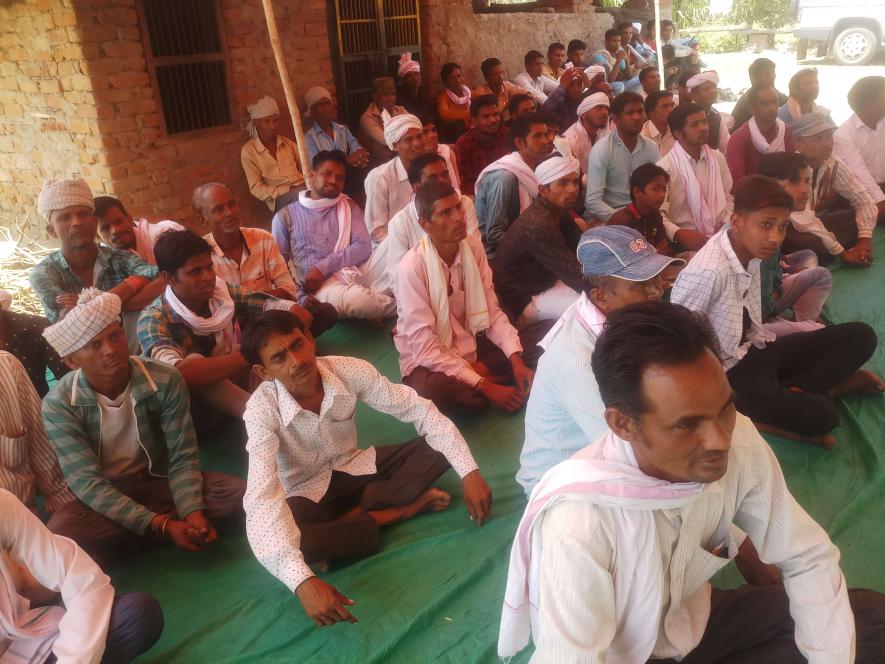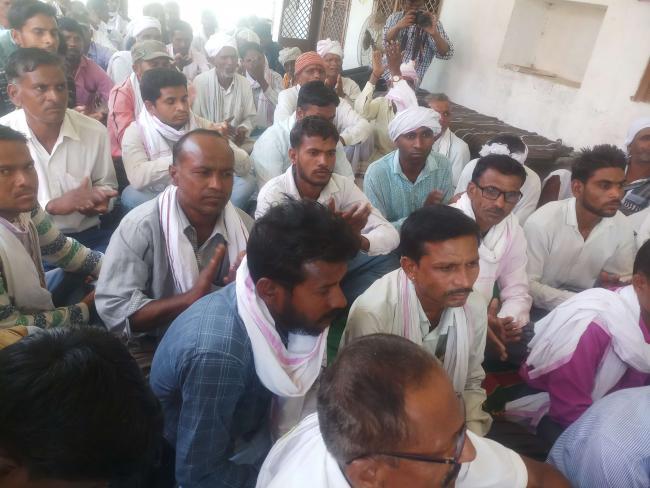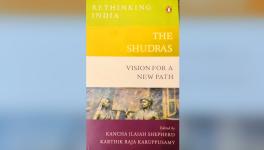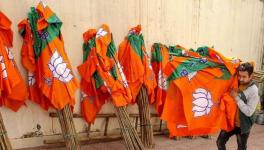Elections 2019: How Bharatiya Tribal Party Is Making Inroads Into Rajasthan Politics

Dungarpur, Banswara (Rajasthan): It was a sunny afternoon with mercury rising close to 42 degrees Celsius and so was the political temperature when Kantilal Roat — popularly known as Kanti Bhai Adivasi — reaches Sera Nagla village at Anandpuri tehsil in Banswara district of Rajasthan for a public meeting. He was greeted with loud slogans — ‘Eik Hi Teer, Eik Kamaan, Adivasi Eik Samaan’ (One bow, one arrow, all tribals are equal). The young leader in his early 40s enthralled the audience with ‘Jai Johar’ (a tribal greeting) chants.
Addressing the small gathering, he talked about land and forest rights, local resources and livelihood for the tribal population. He accused both the major parties of suppressing the tribals and taking their land by force. These are some issues raising on which his party — the Bharatiya Tribal Party — has rapidly made inroads into the State’s tribal belt, where the Congress and the BJP took a long time to establish themselves.
He aggressively opposed Dungarpur-Banswara-Ratlam rail line project — which is being built for the past eight years — and a proposed nuclear power plant project, arguing that the Scheduled Tribe (ST) communities will ultimately be the victims of these so-called developmental works. He alleged that the real estate mafia — which, according to him, wants abolition of special rules that prevent non-STs from buying or owning land in the Scheduled Area — are behind this gambit.

He explains to people the “hazards” of nuclear power plant. “All developed countries across the world have junked the idea of producing nuclear power. It has several health hazards. Once it comes to our villages, the entire creature will get affected. We will lose our forest and land and new health problems will emerge because of radiation. We are opposing the power plant not only for the well-being of the Adivasi population but for everyone living in the region. Our land and mountains are rich in mineral resources and therefore, the government is trying to grab it. The rail project is aimed at transporting the minerals extracted from here. He will oppose it tooth and nail,” he said.
He then talked about their long-standing demand for implementation of the Fifth Schedule defined under Article 244 (1) of the Constitution that promises protection of tribal rights on their own land. “Jal, Jangal, Zameen (water, forest, land) are ours, but different people are ruling it and exploiting it and it is high time that we oppose it with full force. It is our Constitutional right, which has been denied to us since 1950,” he told the audience.
“No party is interested in an honest implementation of the Fifth Schedule of the Constitution to protect Scheduled Areas and Scheduled Tribes. From the status of being the custodians of the land, the tribals have been reduced to penury and forced to seek livelihood for themselves,” he said to the electorate.
He asked people to elect him and strengthen the Bharatiya Tribal Party if they want their voices to be raised in Parliament. Apparently delighted with the response of people who were listening calmly and patiently, he urged the electorate not to get misguided and get trapped in the lofty offers, which would be given to them by Congress and BJP leaders a few days before the election.
He said, “If they (BJP and Congress candidates) offer you money, do not decline. Take it as it is your hard-earned money, but vote only for the BTP.”
The audience burst into laughter and assured him their full support. As he leaves the venue to address another meeting, people appeared convinced with what his young leader said.
“We never saw anyone fighting for our rights like the BTP is doing. Our forest and land is being taken away. Following the Supreme Court’s eviction order to free forest land across the country, the houses of our fellow community men were raised. This is nothing but a grave injustice,” Nanulal, a resident of the village, told Newsclick.
The apex court had passed an order on February 13 to free lakhs of hectares of forest land, rejecting 11.8 lakh title claims of Scheduled Tribes and Other Traditional Forest Dwellers (OTFDs). However, the eviction order was later withheld by the court after the Centre rushed to the top court for modification of the order, urging that the Scheduled Tribes and Other Traditional Forest Dwellers (Recognition of Forest Rights) Act, 2006 was a “beneficial” legislation and should be construed liberally to help “extremely poor and illiterate people” who are not well-informed of their rights and procedure under the law.
Also read: BJP-led Central Government Maintains Silence as Tribals Protest Across India
He accused the government of spoiling the younger generation by turning them into liquor addicts. “Law prohibits liquor shops to be opened in tribal areas. But it is now being sold even through ration shops,” he alleged.
Under Article 244 (1) of the Constitution, any legislation of the Assembly and Parliament cannot be directly implemented in Schedule Areas having tribal preponderance. Para 4 of the Fifth Schedule provides for establishment of a Tribes Advisory Council (TAC), consisting 20 members (three-fourths) from the Scheduled Tribes in the Legislative Assembly of the State. The TAC will advise the Governor on implementation of the Central as well as state legislation. For every work, including the decision of opening liquor shops, the consent of the TAC is necessary.
Others who were present in the meeting admitted that it’s difficult for the BTP to fight against the bigger parties given the little resources its candidates have. But at the same time, they said with conviction that it’s the electorates which decide the fate and that they will ensure BTP’s victory from the constituency.
“Every tribal will fight this election. We committed a blunder in the Assembly election, which we will compensate in this election by sending Kanti Bhai to Parliament,” one of them said.
Mangelal, another villager who could not make it to the meeting, said, “The BTP is challenging the government despite the fact that the party has only two legislators in the 200-member Assembly. If Kanti Bhai goes to the Lok Sabha, it will further boost our voices. It is our election, we will support him and he will support us. We will make his election historic. Whenever we have any problem, he is always at our service. Therefore, his victory will be a great win for our entire community. It will send out a signal to both political parties that they can no more take us for granted. We now have our own voice,” he added.
How The BTP Is Impacting Rajasthan’s Political Landscape
The tribal population in Rajasthan — where politics is dominated by two parties, the BJP and the Congress — appears of late to have found an alternative after the BTP made an impressive foray just three months before the Assembly elections in the desert state in 2018. The party was established in 2017 ahead of the Gujarat Assembly election by former Janata Dal (United) MLA Chhotubhai Vasava.
Of the 14 Assembly seats it contested on in southern Rajasthan, the party won two (Dungarpur district’s Sagwara and Chorasi Assembly constituencies). It came a close second on two constituencies where the winning margin was too small. On another three seats, it secured third position.
It had also won two seats in an alliance with Congress in Gujarat. Tribal students’ groups, such as Bhil Vidhyarthi Morcha, have also extended support to the BTP in Rajasthan.
The party is contesting from five Lok Sabha seats in the state, fielding candidates from Banswara, Jodhpur, Udaipur, Rajsamand and Jalore.
There has been resentment against the Congress and the BJP in tribal-concentrated districts of Udaipur, Banswara and Dungarpur districts — bordering Gujarat and Madhya Pradesh — for the past few years. The tribal population has felt that the major political parties have not taken adequate measures for administration and control of the Scheduled Areas, as mandated by the Constitution.
Also read: Tribals in Rajasthan, MP and Chhattisgarh May Abandon BJP
The entry of the BTP in the districts — which is also known as Marwar region — is the result of the resentment and awareness of the tribal population regarding their rights. The party appears to have stirred politics in the region — which has been a stronghold of the Congress. The Congress has won Dungarpur-Banswara seat in 12 of the 16 elections held here so far. The party has no doubt cast a shadow on the prospects of the Congress and BJP candidates here in this election.
While Congress MP Tarachand Bhagora, who is contesting from here once again, alleged that the tribal party has made a foray into the politics of the region at the behest on the BJP and the RSS to weaken the Congress — the saffron party alleged that the BTP has been formed by “Naxals and Christain missionaries” with an aim to break “Hindu unity”.
“The BTP’s workers in the region are trying to convince tribals that they are not Hindus. But this politics cannot go on for long,” alleged Kantilal Katara, BJP candidate from Dungarpur-Banswara.
Notably, the BJP had won all tribal-dominated constituencies in the 2014 elections.
Who wins and who loses, only time will tell, but one thing is clear that the BTP has successfully kickstarted a new kind of politics that can also be defined as identity politics within the Constitutional framework, which is new to the ST-reserved constituencies.
The politics of quota and ‘Jal, Jangal Aur Zameen’
At present, STs have 45 per cent quota in the region in government jobs. Five per cent seats are reserved for the Scheduled Castes and the rest 50 per cent vacancies in the TSP area is reserved for the local people, who are not tribals but hail from the Scheduled Area.
The region had witnessed a series of protests in the past few years by Adivasis and non-Adivasis for and against the reservation policies in the ST-concentrated districts. In May, 2016, Adivasi Aarakshan Manch Mission 73 Zilla Sangharsh Samiti staged a huge protest at Banswara district headquarters, demanding 73 per cent reservations (according to their population share) for tribals in the Tribal Sub-Plan (TSP) area of Rajasthan. The TSP is a strategy that was introduced by the government to ensure the socio-economic development of the tribal population.
Soon after, a group called Samanta Manch — an organization of general category and OBC people — organized a protest at Dungarpur, demanding reservation in government jobs for the ‘unreserved’ belonging to the Scheduled Area.
The SC community people also staged a protest demonstration in June 2016 to press the government to give the SCs 16 per cent quota in the Scheduled Areas.
The community comprises 17.8 per cent of Rajasthan’s total population and has 16 per cent quota in government jobs in the state. But in the TSP area, they get 5 per cent reservation because their average population in the region is close to 5 per cent of the total population here. In the Dungarpur-Banswara districts, SCs have least concentration (3.5 per cent and 4.5 per cent respectively).
The Samanta Manch and the the Adivasi Aarakshan Manch Mission 73 Zilla Sangharsh Samiti are said to be BJP-supported organisations, as part of their “divisive strategy”.
“The motive behind supporting such groups is to break the solidarity of backward castes in such a way that the anti-reservation lobby can implement their agenda as a long-term plan,” activists working in the area told Newsclick.
The Manch says that it does not oppose caste-based reservation. The general category and OBCs, it says, in the TSP region get 50 per cent reservation, while the rest 50 per cent goes to the ST community. They argue the ‘unreserved’ candidate from the TSP region should be preferred over similar unreserved candidates from other regions of the state.
The Manch also demands that the restrictions on land purchase in the TSP region be lifted. The Fifth Schedule of the Constitution empowers the Governor to ban or restrict sale, purchase and leasing out tribal/forest lands to non-tribes for commercial purposes. The Gram Sabha is the competent authority in the region to safeguard and preserve community resources.
From safe drinking water to sanitation — a saga of tribals’ struggle
Detailed analysis of census data and survey reveal disturbing facts about the life of tribals in the region. The 2011 Census shows only about 11 per cent of ST households have access to clean and safe drinking water. Only 3 per cent of them get tap water from a treated source.
The figures from Rajasthan present a miserable picture. Against 33.4 per cent of non-Tribal population, which has the facility of safe drinking water, only 6.4 per cent of Tribal households in the desert state have access to tap water.
ST population of different age groups living in the TSP area — according to the National Nutrition Monitoring Bureau (NNMB) — consume less than 70 per cent of protein they need. But interestingly, their energy level was found to be higher than their rural counterparts.
Demand for separate Bhil land
Ahead of the Lok Sabha elections, the party has raised the demand for formation of a separate state for the tribal population as they are culturally different from mainland people. They are demanding that a ‘Bhil Pradesh’ be formed by carving out tribal-dominated areas of Rajasthan, Gujarat and Madhya Pradesh. A conclave held on the issue in Banswara recently saw the presence of over 5,000 tribals who took a pledge to support the demand.
Kantilal Roat and BN Chhanval — BTP’s Udaipur candidate — argue that tribals lead a separate exclusive existence and are not fully assimilated into the main body of the people.
“We are culturally and linguistically different from rest of the population. We are not Hindus. We have our own beliefs, which have nothing to do with Hinduism. Hinduism is a Brahminic scripture. The Sangh Parivar, which talks about ‘Hindu Rashtra’, is trying hard to covert tribes into Hinduism through its affiliated organisations. With an aim to protect our culture and beliefs, we are demanding that a separate be formed for us which will be called ‘Bhil Pradesh’. It is our Constitutional demand,” they said.
The BTP’s identity politics and its future
Political analysts also say that BTP is no doubt getting an overwhelming support in tribal pockets of southern Rajasthan and has emerged as a political alternative for the extremely marginalised community.
“As the trend suggests, if mainstream political parties align with such smaller parties, the latter’s identity politics benefit the former’s prospects in the regions where smaller caste groups are not numerically strong to ensure victory but influence the poll outcome. For an electoral democratic system like ours, I think such experiments are always welcome. It gives neglected communities an opportunity to make their voices heard,” Himanshu Pandya, an associate professor at a government college at Raniwara in Jalaur district, told Newsclick.
Asked if he agreed that all attempts of identity politics have always failed, he explained, “The leadership that has emerged from the Poona Pact can never engage in radical politics because all those who contest from reserved seats belong to the reserved castes. It splits the community votes. The candidate who wins confidence of other castes registers victory. So, it is the compulsion of ST/SC leaders that they cannot do radical politics if they want to win elections. And this is the reason why Dr BR Ambedkar was not in favour of the Poona Pact.”
Poona Pact was an agreement signed between Dr Ambedkar and Mahatma Gandhi on September 24, 1932. The agreement was signed by Pundit Madan Mohan Malviya, Dr Ambedkar and some Dalit leaders at Yerwada Central Jail in Pune to break Mahatma Gandhi’s fast unto death against the Britishers’ ‘The Communal Award’ — which had the provision of separate electorates for the Dalits. It was considered as a tool to dive India.
These were the terms of the Poona Pact — seat reservation for the Scheduled Castes (SC) and Scheduled Tribes (ST) in provincial legislature, the STs and SCs would form an electoral college which would elect four candidates for the general electorate, the representation of these classes was based on the standards of joint electorates and reserved seats, about 19 per cent of seats were to be reserved for these classes in legislature, the system of election to the panel of candidates in both, Central and Provincial Legislature should come to end in 10 years, unless it ends on mutual terms, the representation of the classes through reservation should continue as per clauses 1 and 4 until determined, else by mutual agreement between the communities, the franchise for the Central and provincial legislatures of these classes should be indicated in the Lothian Committee report, there should be a fair representation of these classes, in every province, the SCs and STs should be provided with sufficient educational facilities.
Also read: Thousands of Tribals March Down the streets of Delhi Demanding Withdrawal of Eviction Order
It has always been witnessed, he said, that whenever identity politics starts making its presence felt, it has to gradually become inclusive. And it happens only over a period of time, he said.
“The BSP is its best example. In its founding days, the party’s politics was not at all inclusive but later they won the support of non-Dalit communities,” he added.
Udaipur-based political observer CK Verma says emergence of the BTP is the result of resentment among tribals who have been “deceived” by successive governments.
“I don’t find such identity politics problematic till it is within the Constitutional framework. The BTP is demanding their due guaranteed by the Constitution. All their demands are legitimate. But yes, with the passage of time, they will have to be inclusive if they want to spread their popularity, which is always required in electoral politics,” he added.
Get the latest reports & analysis with people's perspective on Protests, movements & deep analytical videos, discussions of the current affairs in your Telegram app. Subscribe to NewsClick's Telegram channel & get Real-Time updates on stories, as they get published on our website.























